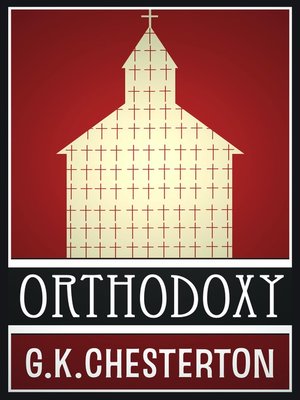
Sign up to save your library
With an OverDrive account, you can save your favorite libraries for at-a-glance information about availability. Find out more about OverDrive accounts.
Find this title in Libby, the library reading app by OverDrive.



Search for a digital library with this title
Title found at these libraries:
| Loading... |
'Orthodoxy' describes Chesterton's discovery of faith – a journey which is compared to an English adventurer who gets lost and unknowingly, discovers England all over again. Here he is doubly blessed, enjoying both the excitement of exploration, and the security of being home. Again, modernist blind spots are exposed, as the reader is invited into 'the thrilling romance of Orthodoxy...there was never anything so perilous or so exciting.'
'Heretics' (1905), 'Orthodoxy' (1908) and 'The Everlasting Man' (1925) form a trilogy of Christian apologetics, chronicling Chesterton's journey to faith, and his reasons for it. Using endless paradox to whip the complacency of rationalism, here is both sweeping argument and comic turn that is at once generous and savage; engaging and furious.
In 'Heretics', Chesterton starts from his belief that the most important thing about a person is their view of the universe, as this determines all else; and he decries the rationalist view for having no vision of ultimate good. Such failure of nerve is expressed in George Bernard Shaw's epigram: 'The golden rule is that there is no rule.' Taking on Ibsen, HG Wells, Kipling, Oscar Wilde and Nietzsche, Chesterton rails against 'the great mental destruction', in which everything is denied, and nothing affirmed. It is a plea for people to believe in something, but not to believe in anything.
'Orthodoxy' describes Chesterton's discovery of faith – a journey which is compared to an English adventurer who gets lost and unknowingly, discovers England all over again. Here he is doubly blessed, enjoying both the excitement of exploration, and the security of being home. Again, modernist blind spots are exposed, as the reader is invited into 'the thrilling romance of Orthodoxy...there was never anything so perilous or so exciting.'
'The Everlasting Man' is a slightly denser work, an outline of history, which sets itself against the view of comparative religion that Christianity is just one belief amongst many; and that all of them are equal. For Chesterton, Christ is not as others, but restores sanity to the world through being both an historical figure and an ideal figure; with the church, 'a winged thunderbolt of thought and everlasting enthusiasm; a thing without rival or resemblance and still as new as it is old.'
Here is exuberant writing that turns all things on their head; to be enjoyed, put aside and returned to.






